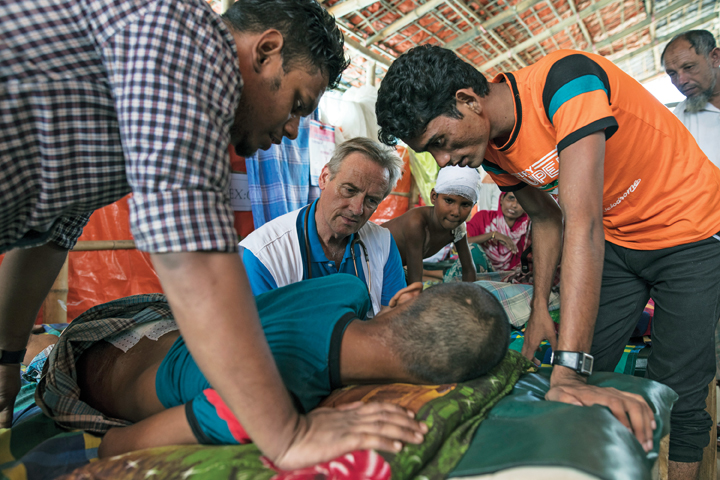Profile: Dr Ian Cross

Roles: GP locum in Leicester; doctor for Médecins Sans Frontières (MSF)
Hours worked per week: During an emergency mission, which can last two months, 10 hours a day, seven days a week, plus permanently on call
Salary: From £13,125 pa, with all costs in the field covered
07.00 My day begins with breakfast with the expat team, a paratha (unleavened flatbread) with vegetable curry and instant coffee with powdered milk. By 7.45 we are on our way to the hospital. On arrival, I make sure all the doctors are at their posts and check on any patients who have been admitted overnight. We have a brief meeting with all the doctors on duty, which doubles as a teaching session. We do this once or twice a week at this time, before the outpatient department fills up.
This is my third mission with MSF. I was working as a GP locum in Leicester when, at the end of August 2017, the violence in Myanmar prompted the biggest influx of Rohingya into Bangladesh seen in recent decades. Within a couple of weeks, I was working at MSF’s hospital in Kutupalong, Bangladesh, next door to the Kutupalong-Balukhali makeshift settlements, where 700,000 Rohingya refugees were residing.
When four young patients died on my first day, I seriously thought of giving up. My basic life support training (to fulfil revalidation requirements) didn’t help much when resuscitating tiny premature babies. However, the support and commitment of the team enabled me to regain my confidence quickly and resolve to get on with the job.
08.30 We begin seeing outpatients, which takes the whole morning: the team will see about 500 new outpatients every day, a third of them children under five. The emergency department is open constantly and manages almost 100 critically ill patients daily. Severe malnutrition is rife among children. We never turn away anyone who needs admission, we just put extra mattresses on the floor and erect another field tent.
When four young patients died on my first day, I seriously thought of giving up
The bulk of the work is done by Bangladeshi doctors, nurses and medical assistants. My role is to provide support, training, advice, help with management of individual patients and referral decisions, and collate data. If a doctor is unable to do a lumbar puncture, for example, I’ll step in to show them how.
While I am the senior clinician, I am constantly learning and in awe of the work that is achieved: it is instructive to contrast the microplanning of a practice flu vaccination campaign with the emergency vaccination of 170,000 children in just 12 days, to halt a measles outbreak in the camp.
14.00 After lunch with the nurse supervisor, psychologist and midwife, I examine a dozen patients who might need referring to a better-equipped hospital. We have a simple laboratory but cannot carry out sophisticated tests; we have to refer for radiography or ultrasonography.
Surprisingly we don’t see much tropical disease, but I have had a steep learning curve with neonatology and trauma (especially gunshot wounds and blast injuries). My greatest asset is 25 years of general practice, because most of the complex patients have general medical problems, albeit presenting later and with more gross pathology.
16.30 As daylight fades, the outpatient clinic seems to get busier as patients are desperate to see a doctor before nightfall. We see the most urgent and hand over to the on-call team. Any patients we can’t see are given advice and told to come back tomorrow.
18.00 We return to the team house to have meetings, eat and rest. We work seven days a week because the workload is so heavy. A GP colleague told me I could have earned as much working as a locum over one weekend as I earn in a month with MSF. But you don’t work for MSF to earn cash. It is hard work but tremendously rewarding.
Between missions, I do GP locum work to remain on the performers’ list and keep my licence to practise in the UK. Experience gained with MSF proves unexpectedly useful. For example, I am unfazed by a patient in Leicester suffering from complications of multi-drug resistant tuberculosis.
If you are interested in volunteering, it helps to have experience of work in low-income countries and a diploma in tropical medicine. Good clinical skills, a ‘can-do’ attitude and a great sense of humour are essential.

















